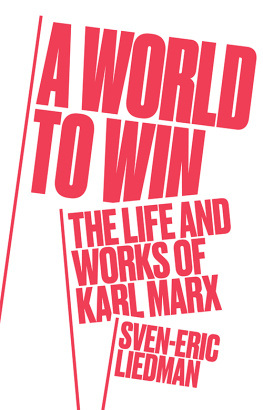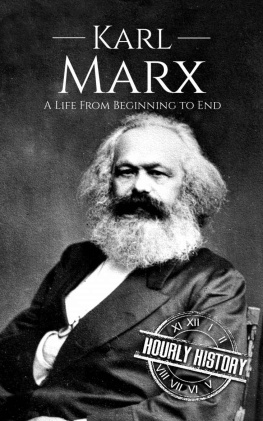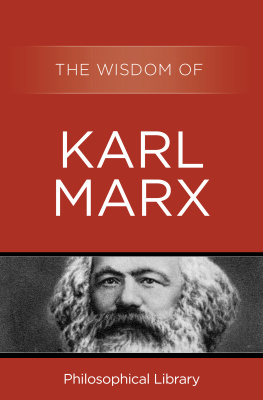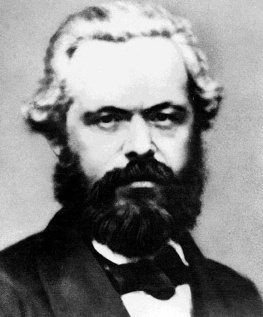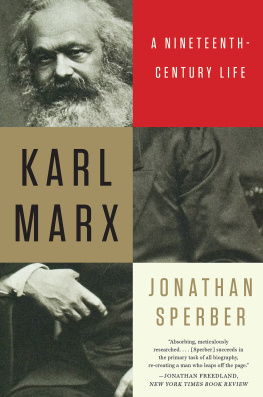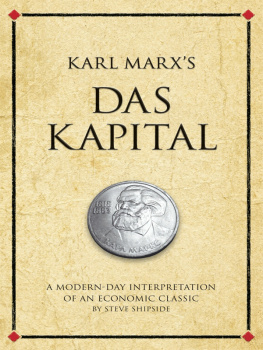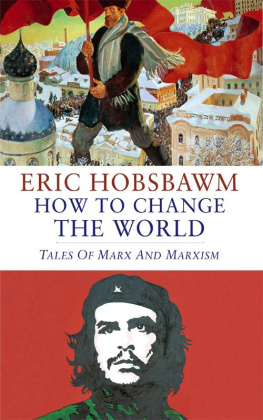Sven-Eric Liedman - A World to Win: The Life and Works of Karl Marx
Here you can read online Sven-Eric Liedman - A World to Win: The Life and Works of Karl Marx full text of the book (entire story) in english for free. Download pdf and epub, get meaning, cover and reviews about this ebook. year: 2018, publisher: Verso, New Left Books, genre: Politics. Description of the work, (preface) as well as reviews are available. Best literature library LitArk.com created for fans of good reading and offers a wide selection of genres:
Romance novel
Science fiction
Adventure
Detective
Science
History
Home and family
Prose
Art
Politics
Computer
Non-fiction
Religion
Business
Children
Humor
Choose a favorite category and find really read worthwhile books. Enjoy immersion in the world of imagination, feel the emotions of the characters or learn something new for yourself, make an fascinating discovery.
- Book:A World to Win: The Life and Works of Karl Marx
- Author:
- Publisher:Verso, New Left Books
- Genre:
- Year:2018
- Rating:4 / 5
- Favourites:Add to favourites
- Your mark:
- 80
- 1
- 2
- 3
- 4
- 5
A World to Win: The Life and Works of Karl Marx: summary, description and annotation
We offer to read an annotation, description, summary or preface (depends on what the author of the book "A World to Win: The Life and Works of Karl Marx" wrote himself). If you haven't found the necessary information about the book — write in the comments, we will try to find it.
A World to Win: The Life and Works of Karl Marx — read online for free the complete book (whole text) full work
Below is the text of the book, divided by pages. System saving the place of the last page read, allows you to conveniently read the book "A World to Win: The Life and Works of Karl Marx" online for free, without having to search again every time where you left off. Put a bookmark, and you can go to the page where you finished reading at any time.
Font size:
Interval:
Bookmark:

of Karl Marx
Sven-Eric Liedman
Translated by
Jeffrey N. Skinner

First published in English by Verso 2018
First published as Karl Marx: En Biografi
Albert Bonniers Frlag 2015
Translation Jeffrey N. Skinner 2018
Every effort has been made to secure permission for images appearing herein
that are under copyright. In the event of being notified of any omission,
Verso will seek to rectify the mistake in the next edition of this work.
All rights reserved
The moral rights of the author have been asserted
1 3 5 7 9 10 8 6 4 2
Verso
UK: 6 Meard Street, London W1F 0EG
US: 20 Jay Street, Suite 1010, Brooklyn, NY 11201
versobooks.com
Verso is the imprint of New Left Books
ISBN-13: 978-1-78663-504-4
ISBN-13: 978-1-78663-507-5 (US EBK)
ISBN-13: 978-1-78663-506-8 (UK EBK)
British Library Cataloguing in Publication Data
A catalogue record for this book is available from the British Library
Library of Congress Cataloging-in-Publication Data
Names: Liedman, Sven-Eric, 1939 author.
Title: A world to win : the life and works of Karl Marx / by Sven-Eric Liedman.
Other titles: Karl Marx. English
Description: London ; Brooklyn, NY : Verso, [2018] | First published as Karl Marx: En Biografi.
Identifiers: LCCN 2018003399| ISBN 9781786635044 | ISBN 9781786635068
Subjects: LCSH: Marx, Karl, 18181883. | Communists Biography. | Communism History 19th century.
Classification: LCC HX39.5 .L47913 2018 | DDC 335.4092 [B] dc23
LC record available at https://lccn.loc.gov/2018003399
Typeset in Sabon by MJ & N Gavan, Truro, Cornwall
Printed in the UK by CPI Group (UK) Ltd, Croydon, CR0 4YY
I t is a great joy for me that my biography of Marx, originally published in Swedish in September 2015, has now reached the English-speaking world. Prior to the translation, the text was updated and a few mistakes in the original have been corrected. The great majority of references to Swedish and other Scandinavian literature have been removed. On the other hand, the German, French and to some extent Italian books and articles remain. I think it important that substantial portions of international Marx research are taken into consideration.
There are two crucial reasons why I having worked on Marx, and Engels as well, from the 1960s until now took on the task of writing a major biography of Marx in the second decade of the twenty-first century.
First, a quarter-century after the fall of the Berlin Wall and the dissolution of the Soviet Union, it has finally become possible to provide a portrait of Marx unobscured by what happened after his death. Quite simply, we have an opportunity to assess the whole of Marxs multifaceted work in a way that would have been impossible only a few years ago.
The second reason is a little more down-to-earth: the major critical edition of the Marx-Engels-Gesamtausgabe has now come so far that the greater part of his work including important, previously unpublished manuscripts and excerpts has been edited in an exemplary manner. It is now possible, for example, to compare Engelss editing of the third volume of Capital with Marxs own manuscript in a completely new way. In excerpts of his reading, with accompanying commentary, Marxs prodigious literary consumption becomes apparent in both its breadth and depth.
In the first chapter of this book, I take a position on a great number of prominent representations of Marx. Since 2015, however, an important English-language biography has become available, namely Gareth Stedman Joness Karl Marx: Greatness and Illusion. It has earned glowing reviews from many quarters and deserves a few words here; I have to be able to explain why another sweeping biography of Marx is needed.
To begin with, it should be said that Stedman Joness work deserves a lot of praise. It is an extremely thorough study that clarifies important parts of the background to Marxs work. In particular, he has mapped out in detail the confusing diversity of the generally short-lived workers movements, from the Chartists up to the time of Marxs death, when various social democratic parties had begun to take shape. There is hardly anything to be added in this regard. In my own biography, these movements have been dealt with to the extent that they are important to understanding Marxs activities, and no further.
Stedman Jones has also very energetically elucidated many important sources of inspiration for Marx. Not infrequently, he does so in such detail that Marxs own writing is actually overshadowed. For my own part, I have certainly provided an account of the literature that influenced Marx. I examine a broader sphere of influence, such as the natural scientists Marx eagerly studied.
But, for me, it was important first of all to present Marxs work in all its breadth. My estimation of Marx as an author is a world away from Stedman Joness assessment of him. He depicts a relatively brief period when Marx was successful both as a theoretician and a politician: the years from 1864 to 1869, when he completed the first volume of Capital and simultaneously played a decisive role in the development of the International Workingmens Association. It is natural to consider this a high point. But for me, the whole body of his work everything from the early years up to the last incomplete manuscripts amounts to a towering achievement, though the great majority of it never went to print during his lifetime.
Stedman Jones sums up rather neatly the original thinking found in the Communist Manifesto, but as regards the Economic and Philosophic Manuscripts he is significantly more reserved. The noteworthy aspects of the substantial preparatory work for Capital, known as the Grundrisse, do not emerge. He judges the text clumsy and disjointed and the presentation chaotic, and perhaps with good reason. But certain pages are brilliant all the same; there as he so often does Marx succeeds in throwing light on his theory with elegant aphoristic incisiveness. In particular, he provides in glimpses a vision of the working life of the future found nowhere else in his oeuvre. Generally speaking, the Grundrisse opens up a broader perspective than the first volume of Capital.
In contrast to Stedman Jones, I am profoundly concerned with the last few decades of intensive research concerning the Grundrisse and in particular Capital. It is striking how names such as Hans-Georg Backhaus, Michael Heinrich, and Andrew Kliman are conspicuous by their absence in Stedman Joness work. As a result, he does not succeed in providing an up-to-date reading of Capital.
The notion that Marx was unproductive after 1870 has a long history, one familiar from many previous biographies. But newer studies have painted a very different picture. At the end of his life, Marx was of course physically much weaker but as restlessly active as ever, deepening and broadening his already voluminous reading. Most of it stopped at detailed, often extremely interesting excerpts. But he also authored a number of manuscripts, some of which attained lasting significance. The Critique of the Gotha Programme belongs here, of course, but so too does the text that formed the basis for Engelss widely read book
Font size:
Interval:
Bookmark:
Similar books «A World to Win: The Life and Works of Karl Marx»
Look at similar books to A World to Win: The Life and Works of Karl Marx. We have selected literature similar in name and meaning in the hope of providing readers with more options to find new, interesting, not yet read works.
Discussion, reviews of the book A World to Win: The Life and Works of Karl Marx and just readers' own opinions. Leave your comments, write what you think about the work, its meaning or the main characters. Specify what exactly you liked and what you didn't like, and why you think so.

